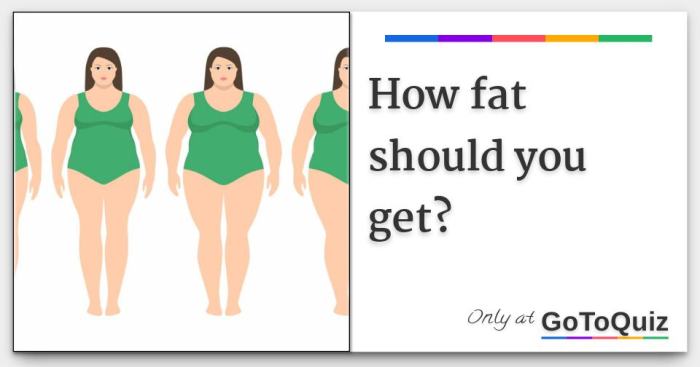Embark on our comprehensive “Should I Gain Weight Quiz” and delve into the intricate world of weight management. This quiz will guide you through a thorough assessment of your weight, health, and lifestyle, empowering you to make informed decisions about your weight gain journey.
Through a series of thought-provoking questions, you’ll gain valuable insights into your current weight status, nutritional needs, and the impact of lifestyle factors on your weight. By completing this quiz, you’ll equip yourself with the knowledge and understanding necessary to achieve your weight gain goals safely and effectively.
Body Mass Index (BMI) and Health Risks
Body Mass Index (BMI) is a measure of body fat based on height and weight. It is a widely used indicator of overall health and can help assess the risk of certain diseases and conditions.
A healthy BMI range is typically between 18.5 and 24.9. Individuals with a BMI below 18.5 are considered underweight, while those with a BMI of 25 or higher are considered overweight or obese.
Health Risks Associated with Underweight
Being underweight can lead to several health risks, including:
- Weakened immune system
- Delayed growth and development
- Increased risk of osteoporosis
- Electrolyte imbalances
- Amenorrhea (absence of menstrual periods)
Health Risks Associated with Overweight and Obesity
Overweight and obesity are linked to an increased risk of:
- Heart disease
- Stroke
- Type 2 diabetes
- Certain types of cancer
- Sleep apnea
- Osteoarthritis
Using BMI to Assess Health Status, Should i gain weight quiz
BMI is a useful tool for assessing health status and identifying individuals at risk for certain diseases and conditions. However, it is important to note that BMI alone cannot provide a complete picture of an individual’s health.
Other factors, such as muscle mass, body composition, and lifestyle habits, can also influence health outcomes.
Nutritional Needs and Calorie Intake

Meeting your individual nutritional needs is crucial for overall health and well-being. When aiming to gain weight, it’s important to consume a balanced diet that provides adequate amounts of essential nutrients like carbohydrates, protein, fats, vitamins, and minerals. Each macronutrient plays a vital role in energy production, tissue repair, and hormone synthesis.Calorie
intake plays a significant role in weight gain. Consuming more calories than your body burns will lead to a positive energy balance, resulting in weight gain. However, it’s essential to focus on nutrient-rich foods rather than simply increasing calorie intake through processed or sugary foods.
Calculating Daily Calorie Requirements
Determining your daily calorie requirements is essential for effective weight gain. Several factors influence calorie needs, including age, activity level, and body composition.*
-*Age
As we age, our metabolism slows down, leading to decreased calorie needs.
-
-*Activity Level
Individuals with higher activity levels require more calories to support their physical exertion.
-*Body Composition
Muscle mass plays a role in calorie requirements, as muscle tissue burns more calories than fat tissue.
The following formula provides an estimate of daily calorie needs based on the Harris-Benedict Equation:
For men:BMR = 66.47 + (13.75 x weight in kg) + (5.003 x height in cm)
(6.755 x age in years)
For women:BMR = 655.1 + (9.563 x weight in kg) + (1.850 x height in cm)
(4.676 x age in years)
Once you have calculated your BMR, you can adjust it based on your activity level using the following multipliers:
* Sedentary (little or no exercise): BMR x 1.2
Lightly active (light exercise 1-3 days/week)
BMR x 1.375
Moderately active (moderate exercise 3-5 days/week)
BMR x 1.55
Very active (hard exercise 6-7 days/week)
BMR x 1.725
Extra active (very hard exercise daily)
BMR x 1.9
Diet and Exercise Considerations

Gaining weight healthily requires a balanced approach to diet and exercise. Let’s delve into the importance of nutrition and physical activity for effective weight gain.
Diet Considerations
A nutritious diet is essential for supporting healthy weight gain. Focus on consuming nutrient-rich foods that provide the necessary building blocks for muscle and tissue growth.
- Protein:Essential for muscle growth and repair. Include lean meats, poultry, fish, eggs, and dairy products in your diet.
- Carbohydrates:Provide energy and fuel for workouts. Choose complex carbohydrates from whole grains, fruits, and vegetables.
- Healthy Fats:Support hormone production and provide energy. Include avocados, nuts, seeds, and olive oil in moderation.
- Fruits and Vegetables:Rich in vitamins, minerals, and antioxidants that support overall health and recovery.
Exercise Considerations
Regular exercise is crucial for weight gain, particularly resistance training. Resistance exercises stimulate muscle growth and increase muscle mass.
- Compound Exercises:Exercises that work multiple muscle groups simultaneously, such as squats, deadlifts, and bench press.
- Isolation Exercises:Exercises that target specific muscle groups, such as bicep curls and tricep extensions.
- Progressive Overload:Gradually increase the weight or resistance over time to continue challenging your muscles and promote growth.
- Adequate Rest:Allow sufficient rest and recovery time between workouts to facilitate muscle repair and growth.
Lifestyle Factors and Sleep

Lifestyle factors can significantly impact weight gain. Stress, inadequate sleep, and poor hydration can disrupt the body’s hormonal balance and metabolism, leading to weight gain.
Stress
Chronic stress elevates levels of the stress hormone cortisol, which can promote fat storage, particularly in the abdominal area. Stress can also lead to emotional eating, where people turn to unhealthy foods for comfort.
Sleep
Insufficient sleep can disrupt the production of leptin, a hormone that signals fullness, and increase the production of ghrelin, a hormone that stimulates hunger. This hormonal imbalance can lead to increased appetite and cravings, resulting in weight gain.
I stumbled upon a quiz on whether I should gain weight, but I got distracted by a fascinating article on fsd 101 basic fiscal law . It made me realize that understanding financial laws can be just as important as maintaining a healthy weight.
Now, back to the quiz. I’m still contemplating whether I need to gain some pounds, but I’ll approach it with a newfound perspective on fiscal responsibility.
Hydration
Proper hydration is essential for overall health and weight management. Dehydration can lead to false hunger cues, as the body may mistake thirst for hunger. Drinking plenty of water can help suppress appetite and promote a feeling of fullness.
Tips for Managing Stress and Improving Sleep Quality
- Engage in regular exercise, which is a natural stress reliever.
- Practice relaxation techniques such as yoga, meditation, or deep breathing.
- Get enough sleep (7-9 hours per night).
- Establish a regular sleep-wake cycle, even on weekends.
- Create a relaxing bedtime routine that includes activities like taking a warm bath or reading a book.
Medical Conditions and Medications

Your weight can be influenced by a variety of medical conditions, including thyroid issues, hormonal imbalances, and diabetes. These conditions can disrupt metabolism, making it harder to maintain a healthy weight.
Medications can also affect your weight. Some medications, such as steroids and antidepressants, can lead to weight gain, while others, such as appetite suppressants and diuretics, can cause weight loss. It’s important to talk to your doctor about any medications you’re taking and how they may affect your weight.
When to Seek Medical Advice
If you’re concerned about your weight, it’s important to see a doctor. They can help you determine if there’s an underlying medical condition that’s contributing to your weight gain or loss. They can also recommend the best course of treatment.
Psychological Factors and Body Image
Psychological factors play a significant role in weight gain. Negative body image, low self-esteem, and emotional eating can all contribute to weight gain and make it challenging to lose weight.
Body image is the way you perceive your body, including your thoughts, feelings, and beliefs about your physical appearance. Negative body image can lead to feelings of inadequacy, shame, and low self-esteem. People with negative body image may be more likely to engage in unhealthy eating habits, such as overeating or restricting food intake.
Emotional Eating
Emotional eating is eating in response to negative emotions, such as stress, anxiety, or boredom. When people eat emotionally, they are not eating because they are hungry, but because they are trying to cope with their emotions. Emotional eating can lead to weight gain over time, as it can cause people to consume more calories than they need.
Improving Body Image
Improving body image can help to promote positive self-esteem and reduce the risk of weight gain. Here are a few tips for improving body image:
- Focus on your positive qualities. Everyone has things they like about themselves. Focus on your strengths and what you appreciate about your body.
- Challenge negative thoughts. When you have negative thoughts about your body, challenge them. Ask yourself if there is any evidence to support these thoughts. Are you really as flawed as you think you are?
- Surround yourself with positive people. Spend time with people who make you feel good about yourself. Avoid people who are critical of your appearance or who make you feel bad about yourself.
- Practice self-care. Take care of your body and mind. Eat healthy foods, get regular exercise, and get enough sleep. When you take care of yourself, you feel better about yourself and are less likely to engage in unhealthy behaviors.
Q&A: Should I Gain Weight Quiz
What is the ideal BMI range for healthy adults?
The ideal BMI range for adults is between 18.5 and 24.9.
How can I calculate my daily calorie needs?
There are various methods to calculate your daily calorie needs, including using online calculators or consulting with a registered dietitian.
What types of foods should I include in my diet to gain weight?
Focus on nutrient-rich foods such as fruits, vegetables, whole grains, lean proteins, and healthy fats.
How much exercise should I do to gain weight?
Incorporate regular exercise into your routine, focusing on resistance training to build muscle mass.
When should I seek medical advice about weight gain?
If you have concerns about your weight or experience any unexplained weight changes, it’s essential to consult a healthcare professional.